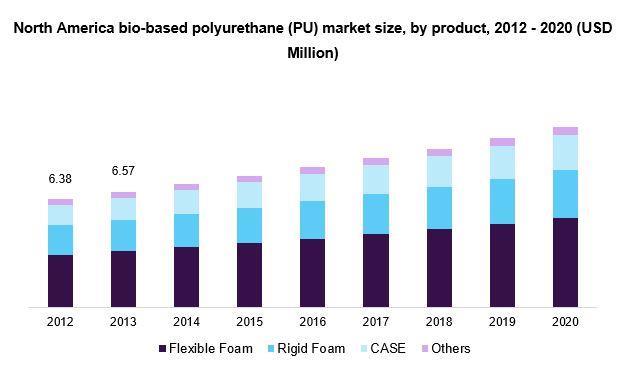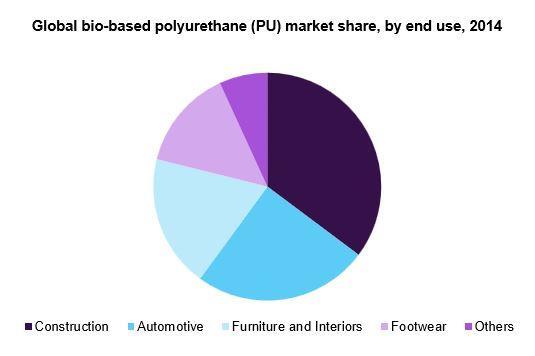
Bio Polyurethane (PU) Market To Grow Enormously With Size Worth 37.5 Million By 2020 |Grand View Research, Inc.
Global Bio Polyurethane (PU) Market is expected to reach USD 37.5 million by 2020 , according to a new study by Grand View Research, Inc. Growing preference for bio plastics on account of environmental concerns, is expected to drive global bio-PU market over the next six years. Growing demand for sustainable products from construction, automotive and footwear industries is also expected to have a positive influence on market growth. Complex manufacturing process and high cost compared to its synthetic counterpart is expected to remain a key challenge for bio-PU market participants.
Flexible foam was the largest product segment and accounted for 49% of total market volume in 2013. Increasing demand from automotive and furniture industries coupled with consumer shift towards adoption of bio-based products is expected to drive this segment. Flexible foam is also expected to witness the highest growth rate over the next six years. The segment is expected to grow at an estimated CAGR of 6.7% from 2014 to 2020.
Favourable government policies for manufacturing bio-based products coupled with stringent environmental regulations for manufacturing petrochemicals and synthetic polymers is also expected to have a positive impact on bio-based polyurethane market growth. Commercially bio-based polyurethane may be obtained by reacting bio-based polyols with synthetic diisocyanates. Polyurethane hence obtained has bio content ranging from 30% to 70% depending largely on the type of bio-based feedstock employed for manufacturing polyols.
Global bio-based PU market is still in its infancy with a limited number of manufacturers. Major companies operating in the market have patented their technologies and have collaborated with biotechnology companies for manufacturing bio-based polyols to process further into polyurethanes. Recent developments such as Lubrizol's acquisition of Merquinsa's bio-based TPU portfolio and a joint venture of BASF and Purac for the production of bio-based succinic acid have been witnessed in global bio-based polyurethane market. BASF collaborated with Ford Motors and formed an OEM for a long-term supply of castor oil based PU foams. Other significant players operating in bio-based polyurethane market include The Dow Chemical Company, Mitsui Chemicals, Rampf Ecosystems, Johnson Controls Inc., Biobased Technologies, Rhino Linings and Hitachi Chemical Company.
To Request Sample Copy of this report, click the link:
https://www.grandviewresearch.com/industry-analysis/bio-based-polyurethane-industry/request/rs4
Favourable government policies for manufacturing bio-based products coupled with stringent environmental regulations for manufacturing petrochemicals and synthetic polymers is also expected to have a positive impact on bio-based polyurethane market growth. Commercially bio-based polyurethane may be obtained by reacting bio-based polyols with synthetic diisocyanates. Polyurethane hence obtained has bio content ranging from 30% to 70% depending largely on the type of bio-based feedstock employed for manufacturing polyols.
Further key findings from the study suggest:
- Global bio-PU market was 1,634.0 tons in 2013 and is expected to exceed 2,546.6 tons by 2020, growing at an estimated CAGR of 6.5% from 2014 to 2020.
- Construction was the largest end-use industry for bio-PU market and accounted for 35% of total volume in 2013. Increasing construction of green buildings coupled with growing consumer preference towards eco-friendly construction materials such as spray foams and coatings, adhesives, sealants & elastomers (CASE) is expected to drive the market.
- Automotive applications are expected to dominate bio-PU market, with demand estimated to grow at a CAGR of 7% from 2014 to 2020. Increasing flexible foam demand from major automotive OEMs, especially in the U.S., for car seats, headrests and dashboard is expected to drive the market. European Commission regulation for reducing vehicle weight in order to limit emissions is also expected to have a positive impact on the market growth.
- Asia Pacific was the largest regional market and accounted for over 30% of total volume in 2013. Availability of natural oil in abundance particularly in South East Asia coupled with government support in the form of tax benefits and financial incentives in countries such as China and India is expected to drive the regional bio-based PU market. Asia Pacific is also expected to witness the highest growth rate over the next six years, at an estimated CAGR of 8.4% from 2014 to 2020.
- Major synthetic polyurethane manufactures have shifted focus towards developing sustainable and environment friendly products. For this purpose, several market players have collaborated with biotechnology firms to synergize their expertise to manufacture bio-based polyurethane. For instance, Lubrizol acquired Merquinsa and integrated its bio TPU products to its portfolio in November 2011. Other major players operating in global bio-based PU market include BASF SE, Bayer MaterialScience, The Dow Chemical Company, Biobased Technologies and Mitsui Chemicals.
Typically, most of the bio-polyols (either polyether or polyester polyols) are produced from castor oil, soybean oil, sunflower oil and rapeseed oil. Development of 100% bio-based polyurethane may act as a drop-in substitute for most of the applications of synthetic PU derived from petrochemical feedstock. Currently, the market size is very low as compared to other bio-polymers owing to the high price of bio-PU. However, shifting focus of end-use industries towards bio-based materials is anticipated to create immense opportunities for bio-based polyurethane market participants over the forecast period.
Major synthetic PU manufacturers globally are shifting their focus towards utilizing more renewable and environment-friendly materials in their products. These manufacturers are collaborating with biotechnology firms and synergizing their domains for producing bio-based polyurethane. Using bio-based raw materials will not only reduce the carbon footprint but also expected to be economically sustainable and may positively impact the performance and durability of the polyurethanes.
Have some specific queries about this report, our team of analyst will be glad to help!
Bio-based polyurethane market growth may, however, be restrained by the complex technology and high cost associated with the manufacturing of bio-PU. The end-products hence obtained also require price alteration to sustain in highly price competitive markets. Technological advancements coupled with capacity expansions in emerging economies may support bio-based PU market to cope with the challenges in the near future.
The rapid developments in the construction sector across the Asia Pacific region supported by the growth in emerging economies like Indonesia, the Philippines, South Korea, and Vietnam are expected to result in higher growth of bio-based polyurethane throughout the forecast period. Rapid urbanization, coupled with increasing per capita disposable income across these countries are estimated to drive the global bio-based polyurethane market during next six years.
Growing concerns towards the environment are expected to boost the market growth. Increasing demand for bio-based renewable resources and decreasing consumption of petroleum-based polymers is also estimated to surge the growth of bio-based polyurethane over the forecast period. Several initiatives implemented by governments and international authorities across the globe to promote the use of bio-based materials in major end-user industries is also expected to boost market growth.
Access complete Bio-Based Polyurethane (PU) Report Portfolio By Grand View research, Inc.
On the basis of products, bio-based polyurethane market may be segmented into rigid foams, flexible foams, and coatings, adhesives, sealants and elastomers (CASE). Rigid and Flexible PU foams together accounted for over 75% of the total demand in 2013. Flexible PU foam dominated the global bio-based PU market demand in 2013.
Flexible foams are used in automotive seating, shoe soles, thermal insulations and sports equipment. Increasing demand for green materials for automotive seating and shoes is anticipated to drive demand for flexible PU foams. Rigid PU foams are employed mainly in furniture and automotive front panels and doors. The CASE products may be tailored to be used in various coating solutions for concrete, wood, plastics and also as binders & waterborne urethanes. Current market size of CASE products is small as compared to foams but is estimated to witness significant growth rates over the forecast period.
Grand View Research has segmented the bio-PU market on the basis of product, end-use:
Global Bio-Based Polyurethane (PU) Product Outlook (Volume, Tons, Revenue, USD Million, 2012 - 2020)
- Rigid Foams
- Flexible Foams
- CASE
- Others
Global Bio-Based Polyurethane (PU) End-Use Outlook (Volume, Tons, Revenue, USD Million, 2012 - 2020)
- Furniture & Interiors
- Construction
- Automotive
- Footwear
- Others
Construction was the largest end-use segment and accounted for just below one-third of total bio-based polyurethane consumption globally. Rising demand for impact-resistant materials made of bio-materials in applications such as insulation panels offers high growth opportunities for bio-based polyurethane market particularly in emerging economies such as China, India, and Brazil. Increasing infrastructure spending coupled with high rate of urbanization in these regions is anticipated to drive market growth.
Growing demand for green polyurethane spray foams in the construction industry is anticipated to have a positive impact on the market growth over the next six years. Demand for bio-based polyurethane from the automotive industry is expected to grow at above industry average growth rates. The increasing number of OEMs by major foam manufacturers such as BASF, to offer automotive manufacturers with customized solutions. This is expected to augment bio-based PU market demand over the next six years. Furniture is also anticipated to increase its market share over the next few years. Other end-uses considered in the report include refrigeration, packaging, and insulation.
Check out special pricing options for sectional purchase and startup companies
The growth of automotive and packaging industries may also spur growth in demand for these bio-polymers in this region. Government regulations in countries such as U.S., UK, France, Germany and China for maintaining optimum bio-based content in plastic products have had a positive impact on bio-based PU market growth. In terms of demand, North America accounted for a major proportion of market share owing to increasing governmental support for the use of bio-based polymers. Over 70.0% vehicles manufactured by Ford Motor Company in North America contain seat components made of bio-based polyurethane foams. North America is however expected to lose out some of its market shares to high-growth regions of Asia Pacific, Latin America, and the Middle East over the next few years.
About Grand View Research
Grand View Research, Inc. is a U.S. based market research and consulting company, registered in the State of California and headquartered in San Francisco. The company provides syndicated research reports, customized research reports, and consulting services. To help clients make informed business decisions, we offer market intelligence studies ensuring relevant and fact-based research across a range of industries, from technology to chemicals, materials and healthcare.
Media Contact
Company Name: Grand View Research, Inc.
Contact Person: Sherry James, Corporate Sales Specialist - U.S.A.
Email: Send Email
Phone: 1-415-349-0058, Toll Free: 1-888-202-9519
Address: 201, Spear Street, 1100
City: San Francisco
State: California
Country: United States
Website: https://www.grandviewresearch.com/industry-analysis/bio-based-polyurethane-industry

Legal Disclaimer:
MENAFN provides the
information “as is” without warranty of any kind. We do not accept
any responsibility or liability for the accuracy, content, images,
videos, licenses, completeness, legality, or reliability of the information
contained in this article. If you have any complaints or copyright
issues related to this article, kindly contact the provider above.




















Comments
No comment